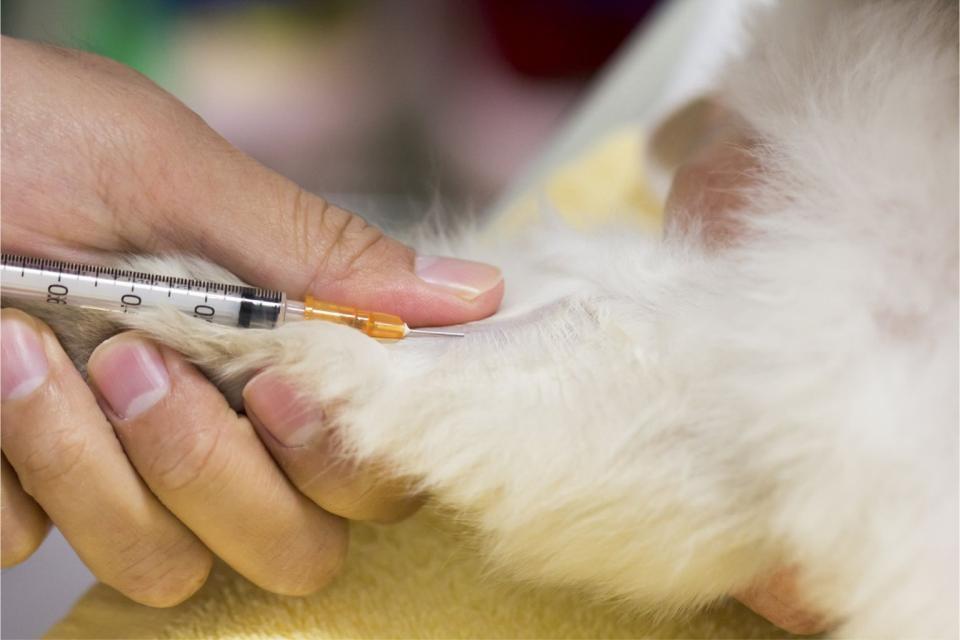
When Will A Veterinarian Order Blood Tests For Cats?
Blood testing can help your veterinarian make a diagnosis and direct treatment, detect underlying conditions early that can then be addressed, and even rule out conditions to direct further diagnostics.
The following situations can result in the need for blood tests for cats:
- On the first veterinary visit: This can be recommended to establish healthy baseline values, and check for any congenital abnormalities or potential concerns, such as screening for Feline Leukemia Virus and Feline Immunodeficiency Virus (FeLV and FIV).
- If a cat doesn't seem quite right: Cat blood tests are suitable for cats that are not displaying any overt signs of illness, disease or injury but are acting abnormally.
- Pre-surgical tests: Cat blood work is used to determine the general health of the liver and kidneys, which helps a veterinarian select the safest form of anesthesia. Blood work can also help determine the surgical risk level of patients
- During senior wellness exams: Cat blood tests are usually recommended for mature, senior and geriatric cats as part of their periodic wellness exams. Along with urine testing, they can help identify conditions which can be effectively managed with early intervention.
At Hallett Veterinary Hospital, many blood tests for cats are processed and analyzed on premises at our in-house laboratory. Having an on-site laboratory allows us to quickly and reliably determine and diagnose a health concern and then implement a successful medical intervention based on the results.
Types of Feline Blood Work
- Feline Leukemia-Feline Immunodeficiency Virus: This is a common test for kittens and cats, especially those coming from unknown origins. These viruses are life-threatening and can be transmitted to other cats, so we recommend this test if you adopt, find, or take in a new kitten or cat.
- Complete Blood Count (CBC): We analyze a CBC to assess hydration status, anemia, infection, blood clotting ability and immune system response. A CBC is important for cats that have symptoms like fever, vomiting, diarrhea, weakness, pale gums or loss of appetite. A CBC can also detect bleeding disorders or other unseen abnormalities as part of a pre-surgical risk assessment.
- Blood Serum Chemistry: We analyze cat blood chemistry panels to evaluate organ function, electrolyte status, and more. These tests are important to evaluating the health of older cats, cats with a wide range of symptoms or toxin exposure, as well as cats receiving long-term medications and general health before anesthesia.
- Total Thyroid Level: We can test blood thyroid levels for hyperthyroidism which can affect many systems in a cat’s body.
Additionally, our in-house laboratory can process and analyze:
- Urinalyses
- Stool Samples
- Cytology
Understanding Your Cat's Blood Work
After we process and analyze a cat blood work sample, the next step is to help our patient's human caretaker fully understand any abnormal results. Your cat's blood work allows our veterinarians to evaluate the following:
- Albumin (ALB): This is a serum protein that helps evaluate hydration, hemorrhage and intestinal, liver and kidney disease.
- Alkaline phosphatase (ALKP): Elevations in this test may indicate liver disease or a secondary effect on the liver, or active bone growth in a young cat..
- Alanine aminotransferase (ALT): This test may determine active liver disease or a secondary effect on the liver..
- Amylase (AMYL): Elevations in this test can indicate pancreatitis or kidney disease.
- Blood urea nitrogen (BUN): This test can assess kidney function. An increased level is called azotemia and can be caused by kidney disease, as well as urethral obstruction, shock, or dehydration.
- Calcium (Ca): Changes in the normal level of this test can indicate a variety of diseases. Tumors, hyperparathyroidism, kidney disease are just a few of the conditions that alter serum calcium.
- Chloride (Cl): Chloride is an electrolyte that is typically lost with symptoms like vomiting or illnesses such as Addison’s disease. Elevations can indicate dehydration.
- Creatinine (CREAT): This test assesses kidney function. An increased level can be caused by kidney disease, urethral obstruction, shock, or dehydration..
- Globulin (GLOB): This is a blood protein that often increases with chronic inflammation and certain disease states.
- Glucose (GLU): Glucose is blood sugar. Elevated levels may indicate diabetes mellitus. Low levels can cause collapse, seizures or coma.
- Potassium (K): This is an electrolyte typically lost with symptoms such as vomiting, diarrhea or excessive urination. Increased levels may indicate kidney failure, Addison’s disease, dehydration or urethral obstruction.
- Lipase (LIP): Lipase is an enzyme that may indicate pancreatitis if elevated.
- Sodium (Na): Sodium is an electrolyte often lost with signs vomiting, diarrhea, and kidney disease. This test helps indicate hydration status.
- Phosphorus (PHOS): Elevations in this test are often associated with kidney disease.
- Total bilirubin (TBIL): Elevations in this test may indicate liver or hemolytic disease. This test helps identify bile duct problems and certain types of anemia.
- Total protein: This test indicates hydration status and provides additional information about the liver, kidneys and infectious diseases.
- Thyroxine (T4): Thyroxine is a thyroid hormone. High levels indicate hyperthyroidism in cats.
The Role Of Cat Blood Work In Diagnosis Of Disease
Cat blood work is an essential component in the diagnosis of disease. Just like any diagnostic tool, blood tests for cats are more effective when used as part of a diagnostic plan which may include other tests. For example, elevated BUN and creatinine levels can indicate a kidney problem. However, they can also indicate mild dehydration in the period leading up to the blood work. This is why ordering additional testing, such as a urinalysis, is necessary to obtain an accurate diagnosis.
